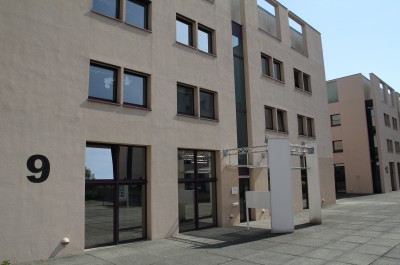The next lecture of 2024 will take place on Tuesday, 7 May 2024 at 6 pm:
Aggression and violence against politicians in Germany – Presentation of a Germany-wide research project at all political levels
Please note the following important information:
Registration is required for your participation. We use an online registration form for this purpose.
You will receive the participation link directly after registration, so that this can also be done at very short notice. Participation is free of charge. A certificate of attendance will be issued on request (integrated in the registration form) and sent to you by e-mail in the days following the event. Please understand that it may take a few days to generate them.
If you have any questions or problems with registration, please contact us at KrimKoll@kfn.de.
We look forward to your participation.
Since February 2021, the KFN Criminological Colloquium has been officially listed as a recognised training event in the Criminal Courts and Public Prosecutor’s Offices division in Lower Saxony. Judges and public prosecutors in Lower Saxony are therefore asked to indicate when registering that they belong to the Lower Saxony judiciary and that a certificate of attendance will be required afterwards. The event will also be recognised as further training for accredited BDP/DGP specialist psychologists. The certificate of attendance will then be sent by the KFN to the respective participants by e-mail. The certificate of attendance can then be voluntarily submitted to the employer as further training.
The KFN has been organising the Criminological Colloquium since February 2017. As part of this series of events, scientists from various disciplines report on current findings from criminological research. The colloquium is aimed not only at representatives from academia and relevant practice, but also at the general public.
All interested parties are therefore cordially invited to attend the lectures and subsequent discussions.
When? Every first Tuesday of the month, 6.00 pm to approx. 7.30 pm
Where? At the Criminological Research Institute of Lower Saxony e. V.,
Lützerodestr. 9, 30161 Hanover (currently only digital participation)
Participation is free of charge.
Previous topics
- Coping with emotionally challenging research: Findings from the Researcher Wellbeing Project (Dr. Tina Skinner)
- Proactive violence and social order (Prof. Dr. Michael Windzio)
- First results of the Berlin Farm Crime Investigation (Prof. Dr. Kirstin Denkhahn)
- Excessive use of force by the police – situations, assessments and processing (Laila Abdul-Rahman and Prof. Dr. Tobias Singelnstein)
- Sentencing Guidelines in England and Wales: A Pioneer for the German Judicial System (Prof. Julian Roberts)
The presentation slides are available for download here.
- The development of opioid-dependent prisoners after their release in dependence on addiction treatment (substitution vs. abstinence-orientated) (Prof. Dr Mark Stemmler)
The presentation slides are available for download here.
- Experiences of discrimination and victimisation through prejudice crime – Empirical insights into the perspectives of those affected (Prof. Dr. Eva Groß and
Prof. Dr. Joachim Häfele)
- Juvenile delinquency in the school and residential context (Prof. Dr. Clemens Kroneberg)
The presentation slides are available for download here.
- Sexuality and violence among young people (Prof. Dr. Elisabeth Tuider)
- The late prosecution of Nazi crimes by the German criminal justice system (Prof. Dr. Boris Burghardt)
- Evaluation of the reformed provisions on human trafficking in the German Criminal Code – results of a current study (Nora Labarta Greven and Prof. Dr. Tillmann Bartsch)
The presentation slides are available for download here.
- What remains of the fundamental right to euthanasia? (Prof. Dr. Bernd Hecker)
The presentation slides are available for download here.
- Abortion in law (Prof. Dr. Liane Wörner)
- Detention at home versus in prison – differences in the legal probation of prisoners after electronically monitored house arrest and imprisonment in a correctional facility (Cornelia Auer)
- Values and attitudes of (Muslim) juvenile prisoners (Dr. Wolfgang Stelly, Paulina Lutz)
- Financing terrorism (Prof. Dr. Frank Saliger)
- Pornography and sexual self-determination (Dr. Anja Schmidt)
- Radicalisation – Empirical findings, conceptual ambivalences and socio-political consequences (Dr. Julian Junk)
- Resilience (Prof. Dr. Raffael Kalisch)
- Evaluation of the anti-doping law (Prof. Dr. Elisa Hoven)
- Who decides what you can say online: Rule-making in digital communication spaces (PD Dr. Matthias C. Kettemann, LL.M. (Harvard))
- The practice of plea bargaining in criminal proceedings. Results of a nationwide online survey. (Prof. Dr. Jörg Kinzig)
- Cybercrime – The discrepancy between light and dark field (Mag. Dr. Edith Huber)
The presentation slides are available for download here.
- Crime – causes and prevention (Prof. Dr. Britta Bannenberg)
The presentation slides are available for download here
- Sexual abuse of minors by clerics (Prof. Dr. Harald Dreßing)
- Clan crime (Prof. Dr. Dorothee Dienstbühl)
- Right-wing populism in the world of work. (Björn Allmendinger)
- Sharia as a path to justice? An analysis of the reception of Salafist online videos by young people. (Lino Klevesath, M.A & Annemieke Munderloh, B.A, Research Centre FoDEx, Institute for Democracy Research (University of Göttingen))
- Who do the police control? Findings on ethnic profiling in urban police departments (Dr. Daniela Hunold)
- Violence and conflicts in public administration (Prof Dr Johanna Groß)
- Religion and violence (Johannes Beller, M.Sc.)
- Is it all just a game?! Aggressive fantasies as predictors of aggressive behaviour? (Prof. Dr. Rebecca Bondü)
- Turning to political violence: The Emergence of Terrorism (Dr. Marc Sagemann)
- Brain biological foundations of violent behaviour (Prof. (em.) Dr. Bernhard Bogerts)
- Politically motivated violence among adolescents – Selected results of a quantitative student survey (Dr. Alexander Yendell and Julia Schuler)
- Delinquency among young immigrants: A migration-specific phenomenon or typical adolescent behaviour? (Prof. Dr. Peter F. Titzmann)
- Cybercrime – Current developments in a new field of offences (Andreas May and Dr. Benjamin Krause)
- Ideologised interpretations of Islam among young people (Dr. Anja Frank)
- Addictive disorders – Who gets caught up in the maelstrom of addiction? (PD Dr. Hans-Jürgen Rumpf)

